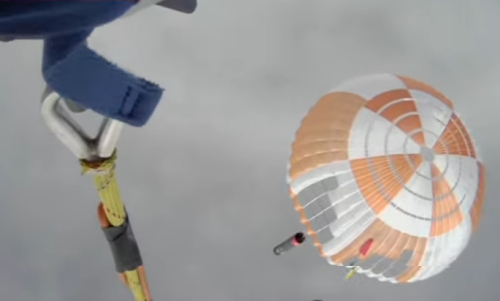Rocket Lab might forgo use of a helicopter in recovering its Electron 1st stages
According to Rocket Lab’s CEO, Peter Beck, the company might abandon the use of a helicopter and the in air capture of the first stages of its Electron rocket 1st stages and instead simply fish them out of the water, refurbish them, and then reuse them.
In the second attempt last November, Rocket Lab called off the helicopter catch because of a momentary loss of telemetry from the booster. The company instead allow the stage to splash down in the ocean, where a boat recovered it and returned it to Rocket Lab’s facilities. “This turned out to be quite a happy turn of events,” he said on the call. “Electron survived an ocean recovery in remarkably good condition, and in a lot of cases its components actually pass requalification for flight.”
He said the company is planning an ocean recovery on an upcoming flight after incorporating additional waterproofing into the vehicle “Pending this outcome of testing and analysis of the stage, the mission may move us towards sticking with marine recovery altogether and introduce significant savings to the whole operation.”
As Elon Musk has said, “The best part is no part.” It appears that by having the stage come down softly and controlled by parachutes it is possible to get it out of the water fast, without much damage. If the first stage can then be reflown then it makes sense not to bother with the helicopter recovery.
Beck also indicated during his phone presentation that the company is still targeting fifteen launches in 2023, and that the demand for launches has allowed the company to maintain its launch prices, with the prospect of raising them soon.
According to Rocket Lab’s CEO, Peter Beck, the company might abandon the use of a helicopter and the in air capture of the first stages of its Electron rocket 1st stages and instead simply fish them out of the water, refurbish them, and then reuse them.
In the second attempt last November, Rocket Lab called off the helicopter catch because of a momentary loss of telemetry from the booster. The company instead allow the stage to splash down in the ocean, where a boat recovered it and returned it to Rocket Lab’s facilities. “This turned out to be quite a happy turn of events,” he said on the call. “Electron survived an ocean recovery in remarkably good condition, and in a lot of cases its components actually pass requalification for flight.”
He said the company is planning an ocean recovery on an upcoming flight after incorporating additional waterproofing into the vehicle “Pending this outcome of testing and analysis of the stage, the mission may move us towards sticking with marine recovery altogether and introduce significant savings to the whole operation.”
As Elon Musk has said, “The best part is no part.” It appears that by having the stage come down softly and controlled by parachutes it is possible to get it out of the water fast, without much damage. If the first stage can then be reflown then it makes sense not to bother with the helicopter recovery.
Beck also indicated during his phone presentation that the company is still targeting fifteen launches in 2023, and that the demand for launches has allowed the company to maintain its launch prices, with the prospect of raising them soon.


